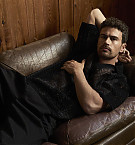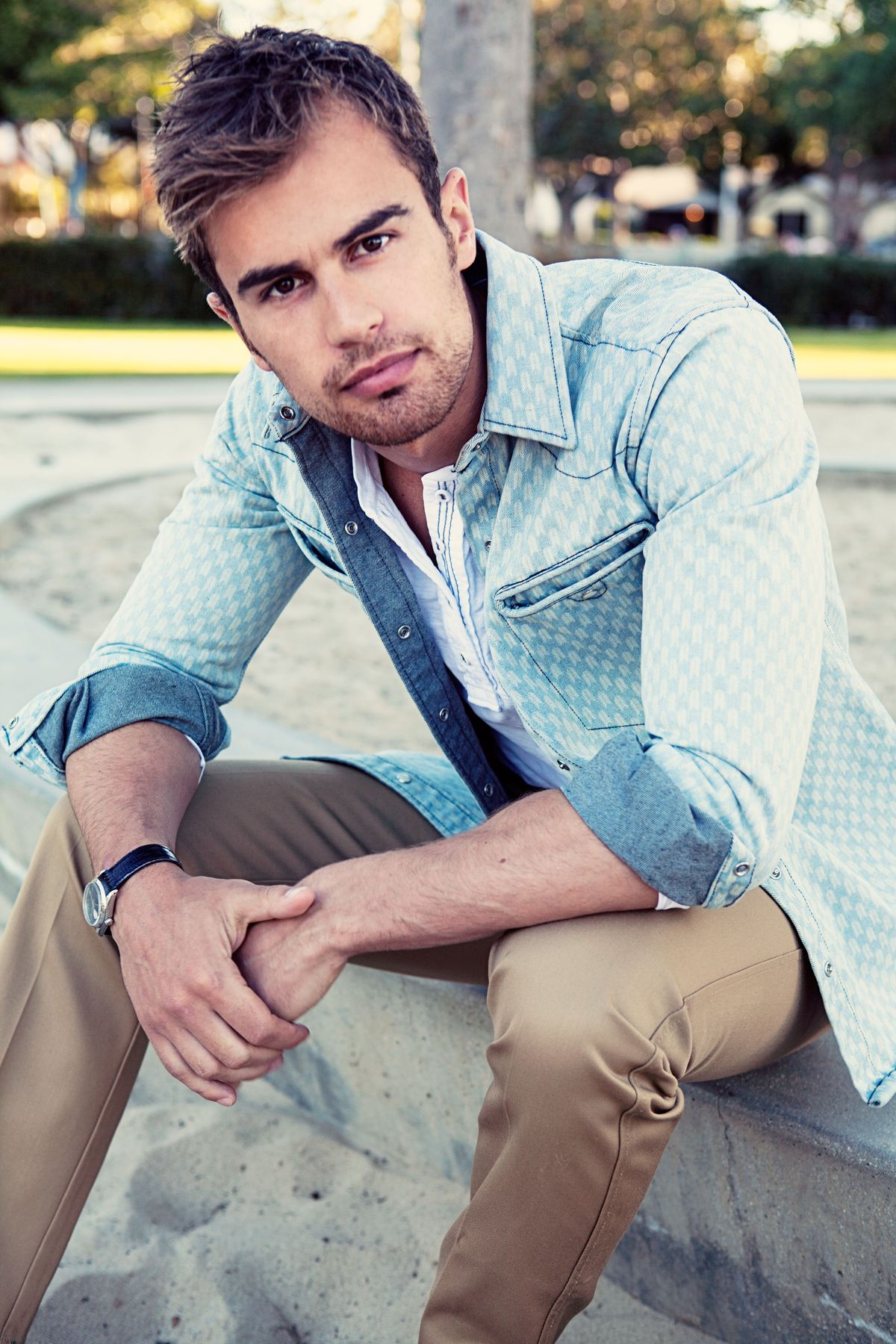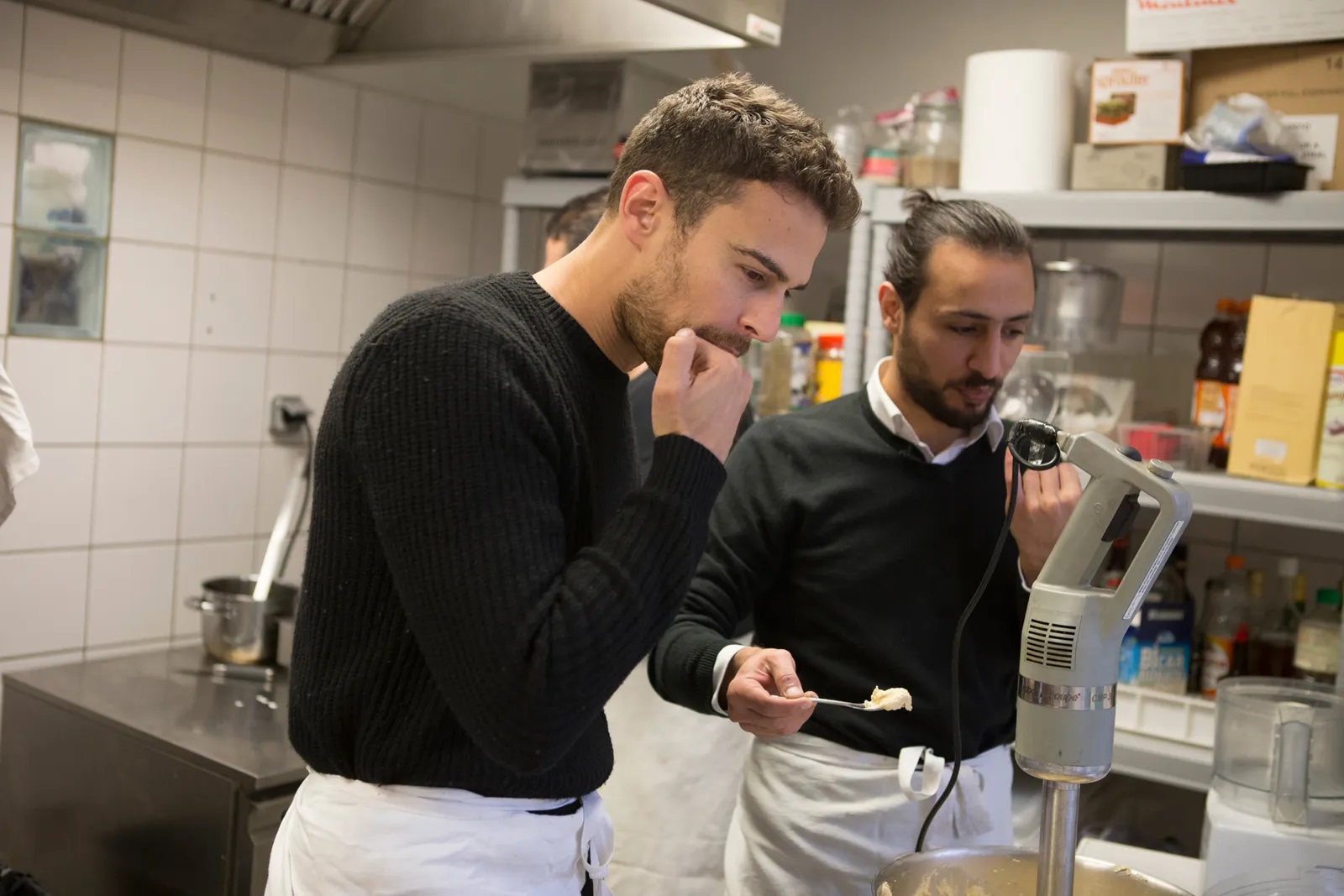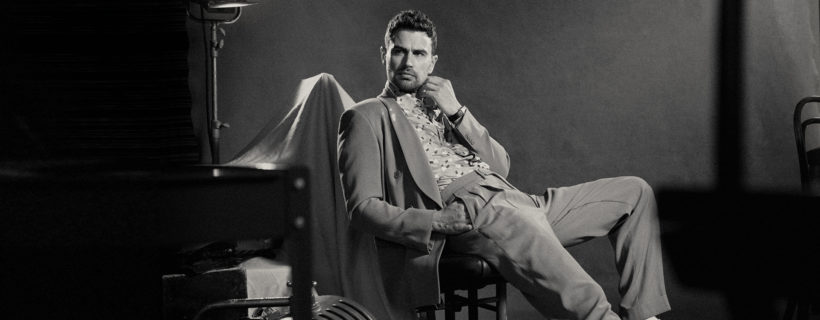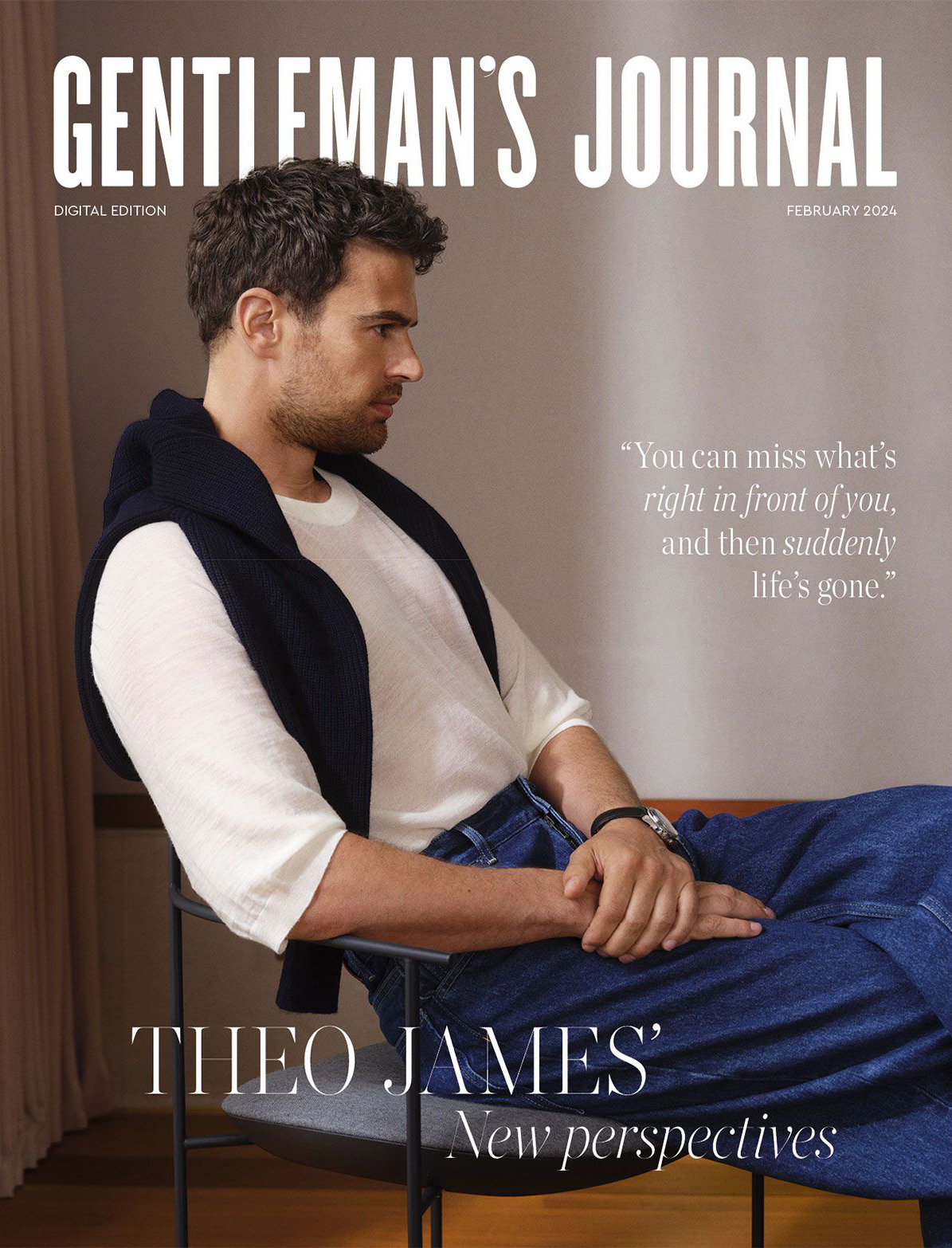When Theo James first appeared on TV and movie screens in the early 2010s, he wasn’t given many chances to be funny. With his dark eyes and chiseled cheekbones, he was slotted into mostly boring love-interest roles. He romanced Lady Mary on “Downton Abbey” only to promptly die. He entered the bland sci-fi YA world of the “Divergent” series to woo Shailene Woodley.
But sitting in a hotel room at the Four Seasons Beverly Hills, James, 40, dressed in a boxy ensemble of muted grays and browns, was keen to remind me that he really enjoys being a sort of cheeky bastard.
“I quite like broad humor and s— humor, and I keep getting told off for it,” he says, erupting into a devilish laugh. It’s a laugh that I’ll witness a couple of times throughout our conversation. James’ eyes widen once he knows he’s said something naughty, delighting in his mild transgression. (He’s still, for the most part, a very polite Englishman.)
This quality in James makes his latest role — or should I say roles — a perfect fit for the actor. He stars in “The Monkey,” the latest from “Longlegs” impresario Osgood Perkins. James plays both Hal and Bill, twin brothers whose family is cursed by the presence of a murderous windup monkey their father brings back from a trip. Like many horror films these days, it’s about a legacy of generational trauma, but, unlike most of those, it’s also extremely funny. When the monkey starts beating its drum, people die in gruesome and hilarious ways. (A throat is sliced at a hibachi dinner; a pool turns a diving woman into a shower of blood.)
But the humor also comes from James, who creates a distinctive weirdness for each brother. Hal is a glasses-wearing introvert trying to keep his estranged teenage son away from the terror that haunts his family; Bill is a theatrical douchebag with a mullet attempting to wreak havoc.
It’s a dual turn that caps a career-redefining last couple of years for James, who thanks to similarly surprising work in “The White Lotus” and “The Gentlemen” is now proving himself to be an actor willing to take risks.
“I think early in my career, I felt a little boxed in after doing a kind of slight studio world — and you do have to wrestle your way out of that,” he says. “And then there’s the aesthetics of it, being seen as, you know, f— hunky or whatever it is. You have to kind of force yourself not to be defined by that.”
Not that James isn’t hunky. In fact, his perfume-campaign-worthy looks — combined with that sense of gleeful playfulness — are what convinced Perkins he was the right man to play Hal and Bill. They had met earlier when James, as a producer, was trying to develop a television series called “Who Put Bella in the Wych Elm?” about the mysterious discovery of a skeleton in the English countryside. That never got off the ground, but their personalities aligned.
“He’s a movie star, right?” Perkins, 51, says, matter-of-factly. “I wanted to be reminded of the sensation that I had when I went to see ‘Gremlins’ with my parents. The idea that you could see a weird gross-out movie with your family.”
Perkins used Cary Grant as another example of the kind of throwback performance that he was looking for: Grant could be an everyman saying funny dialogue but still looked like Cary Grant.
“It’s that sort of beautiful alchemy that Hollywood allows for,” Perkins says.
James himself was thinking of another classic star when he entered the business — more of a brooding, serious type.
“When you start out in your 20s, I think lots of young actors want to be James Dean or something,” he says. “What I realize now [is] what I would like to be is just known for being an actor who does a gamut of different work.”
His path to acting primed him to be versatile. James grew up in Buckinghamshire outside London, the youngest of five siblings. It was a “chaotic madhouse,” per the actor, in which the kids would perform to stand out, but he was the only one to end up pursuing anything professionally.
After studying philosophy at the University of Nottingham, he wanted to be an indie rock star and had what he calls a “modicum” of success with his band Shere Khan. “And some even other worse-named bands than that,” he quips, that self-deprecation once again coming through as he sinks into a chair, playing with a fraying piece of fabric on the arm.
He had done comedy at university, taking a sketch show called “The Slippery Soapbox” to the Edinburgh Fringe Festival every summer, but only considered auditioning at drama schools once his girlfriend at the time decided to do so. He got into the Old Vic, where he was trained in Jacobean Shakespeare. The technique didn’t serve him particularly well when he started auditioning for the screen.
“I got out of drama school with a s—load of debt,” he says, erupting in another cackle. “And plays don’t pay, to be honest, unfortunately. Screen was the place you needed to go to pay off your debt, but I remember having some pretty bad early auditions where they were like, ‘Please stop shouting in my face.’”
Opportunities did start to come, including the “Divergent” films, based on a bestselling young adult series and designed to be the next “Hunger Games,” where he co-starred opposite Woodley as the love interest named Four in a dystopian society. The trilogy was a box-office success but never became a cultural phenomenon. A fourth film was ultimately scrapped.
His early ups and downs gave James a healthy sense of skepticism. “One thing that you learn is, anything you do, everyone around you wants it to be a success, so the voices around you are, like, ‘Hey, this is the best thing ever f—ing made,’” he says. “And even if you are sanguine enough, subconsciously that leaks into you.”
James learned to take everything with a grain of salt. “Some people think I’m a little bit — not pessimistic, but not joyful enough,” he says. “But I guess I’ve been doing it long enough that you never know until the thing’s out. And even when it’s out, you don’t really know.”
The trajectory of his professional life changed when he was cast in the second season of “The White Lotus” as Cameron, a finance dude on vacation with his wife who loves to party and constantly neg his supposed friend. James was grateful for the opportunity to do comedy again, but he also felt he knew the character intimately.
“There was a piece of me in there,” he says. I mention that it’s amusing of him to say there’s a piece of himself in a character most people find pretty loathsome.
“The nice bits of Cameron are in me,” he says, laughing. Not the parts of him that are an unprintable word commonly used in Britain. He elaborates, this time without the slang. “What I wanted to bring was a kind of affability,” he says “You want to bring people together. You want to drink and have fun, take the piss out of yourself and others around you, never take yourself too seriously, which I think are the positives of him.”
A seal of approval from “White Lotus” writer-director Mike White also comes in handy when it comes to convincing other directors of an actor’s talent.
“What Mike White does is so insanely strong that when he ratifies an actor — or gives someone their moment — it’s just so deeply impressive,” Perkins says. “In a way, you almost draft off of that. You’re like, ‘Oh, Mike White saw in Theo this amazing thing. If Mike White validates it, I’m probably going to try it too.’”
Perkins explains he has a somewhat hands-off approach to the performances in his films, mostly leaving the actors free to interpret the script as they wish. But James says he and Perkins did discuss 1980s Tom Hanks as a touchstone for Hal — “the everyday Joe,” the actor says. “The world had beaten him down a bit, but he had a twinkle in his eye and a slight irreverence to the things that happened around him.”
For Bill, on the other hand, James imagined him as a petulant child in a man’s body, an idea complemented by the costume, which finds him rocking a too-tight suit jacket that makes him look like a glam rocker.
As Bill, James fully indulged his goofy side in deleted sequences that he describes as “incredibly weird.”
“There was one scene where I was crawling around on my hands and knees yelping like a dog, there’s another one of me crying, there’s another one of me licking the microphone when a character appears at the house,” he says. “We went pretty hard on it, and I’m lucky some of that didn’t end up in the movie.”
Perkins, however, was most impressed by the smaller emotional beats that James brought to Hal, specifically one in which he utters the name of his mother for the first time since she died.
“When he does that moment, it’s really gorgeous,” Perkins says. “You see it choke him and you see it be this thing that’s too precious to even give out to this horrible world. The precious name of his mom was not something that he even exposed to the elements.”
Although “The Monkey” is based on a Stephen King short story, it’s also a deeply personal movie for Perkins, the son of “Psycho” star Anthony Perkins and model Berry Berenson, who both died in tragic circumstances. (Anthony kept his AIDS diagnosis a secret before dying in 1992; Berenson was killed in one of the hijacked planes on 9/11.)
Still, the movie’s legacy of family trauma also rang true for James, the father of two young children.
“I am constantly terrified that I am impressing something upon them, which they don’t want in their later lives,” he says. “You try to be as good as you can as a parent, but you’re going to make mistakes.”
One of his fears is about not being present enough. The nature of being a working actor means sometimes being called away for months at a time. After he leaves Los Angeles following the premiere, James will head to Korea to shoot “The Hole,” co-starring “Squid Game” actor Hoyeon, a project he describes as “‘Misery’ meets ‘Parasite.’” He’ll then return to London, one of his home bases, to shoot the second season of “The Gentlemen,” the Netflix Guy Ritchie crime drama that has also significantly raised his profile.
James wasn’t quite sure how the hyperviolent-yet-jokey “The Gentlemen” would be received.
“It was a complex shoot where I didn’t know what the outcome necessarily was going to be,” he says. “But it’s actually been very satisfying in a way because what Guy does connects with quite a broad audience.”
People of all ages have been stopping him on the street to compliment him on his work as Eddie Horniman, the U.N. peacekeeper turned crime lord.
James and his wife, actor Ruth Kearney, currently split their time between London and Venice Beach. Now that their daughter is nearly 5, they are trying to decide whether they want their children to go to school in California or England.
“I like London — it’s good to be close to Europe and some cultural sensibilities,” he says. “But I do love California as a state with young kids. It’s the great outdoors. You don’t have to wrestle a coat on a 4-year-old every morning. The gray of London is pretty monotonous.” (On the day we speak, Beverly Hills feels more like Bloomsbury: overcast with a perpetual drizzle.)
Not that James seems like a Hollywood type. Despite modeling for Hugo Boss, he asks me to check the tag of his pants when I ask him what brand they are. (Studio Nicholson, for those wondering.) He began working with the U.N. refugee agency as a result of the Syrian civil war. His grandfather was a Greek refugee from World War II who ended up in Damascus, and he wanted to honor that history.
“The beginning of it was just trying to remind myself and others and members of my friends and family that things like that can happen all the time,” he says. James continued his volunteer work in part because he was uncomfortable with the “murky world between doing your job” and then “this idea of a celebrity.” He’s now a goodwill ambassador.
As for the fame game, he’s fine with it, in moderation.
“I realized dipping a toe in is fine, but be careful of the elixir of it,” he says. “There’s something quite glamorous, sexy, when you go to parties and tap people on the shoulder and you hug each other. Do that occasionally but mainly keep your old friends that you’ve known since you were a kid. That will ground your identity.”
Now that he’s turned 40 — an “old dog” in his parlance — the jobs he takes have to be worth it, he says: odd, funny and challenging. Just like “The Monkey.”
“I would like to do things that are unexpected and are a little subversive because I think that will be more interesting for me as an actor,” James says. “I think when you have to be away from your family, for example, you don’t want to be away and you’re there thinking, ‘Why did I do this crock of s—?”
There’s that not-quite-pessimism, the proverbial monkey on his shoulder. It’s serving him well.








